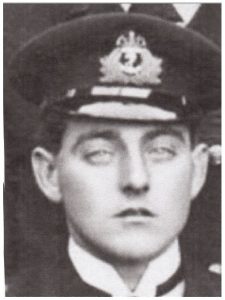Royal Navy, Submarine E.18

Walter Luke Landale was one of three sons born to Walter and Ethel Maud Landale. He was born at Chesham, Buckinghamshire on 8 December 1889. but by 1911 the family home was The Hayes, Prestbury.
In May 1905, at the age of 16, Walter entered Britannia Royal Naval College, Dartmouth as a Cadet. His first posting as a Midshipman came in September 1906 and thereafter until the summer of 1912 he served principally in the Mediterranean on various ships, rising to the rank of Lieutenant in 1911.
From July 1912 he trained on submarines and his first posting was in November 1914 to HM Sumarine D.4.
On 5 July 1915 he transferred to the brand new ‘E’ Class Submarine E.18, where he was one of two junior officers below the captain.
E.18’s initial deployment was on patrol duties in the North Sea. In September 1915 it was despatched to the Baltic Sea, to join a small flotilla of British and Russian submarines operating out of Reval (now Tallin), Estonia. The flotilla was tasked with disrupting the iron ore shipments from Sweden to Germany.
There were a few minor encounters with the enemy before icy seas forced confinement to port in Tallin from January 1916 until late in the following April.
On 26 May 1916 E.18 torpedoed the German destroyer V100, blowing off its bow. The last reported sighting of E.18 was by a German U-boat on 1 June 1916.
Nothing was heard from it after this date.
In October 2009 a Swedish survey vessel located the wreck of E.18 off the Estonian island of Hiiuaa about 90 miles west of Reval. A remotely operated vehicle was sent down to photograph the wreck and this revealed damage and open hatches, a strong indicator that it had struck a mine whilst travelling on the surface.
The sinking probably occurred on 2 June 1916: the 11 June shown in records is an administrative date when the vessel was finally declared ‘lost’. The ship’s company consisting of three British officers and twenty seven ratings, plus three Russians, one officer and two signallers, were all lost.
According to Lieutenant Landale’s service record, in March 1916 he was awarded the Russian Order of St Anne, 3rd Class with Swords for his service in the Baltic.
